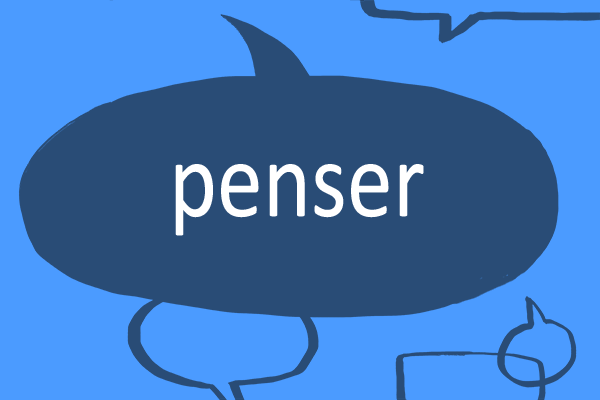We’re back with another verb for our French word of the week blog – are you ready to learn about penser?
To hear the correct pronunciation of the word, listen to the audio clip below:
We’ll start by explaining the meaning of penser in English – you can translate this verb as to think. To help you remember its meaning, you could link it to the English word ‘pensive’, which does actually come from the French penser.
Penser follows the regular conjugation pattern for -er type verbs. For a refresher, visit our Easy Learning French Grammar pages about regular conjugation of -er verbs in the present indicative, present subjunctive and imperfect tense.
Let’s get into some examples of penser in action. As in English, remember that the verb ‘to think’ can convey both a sense of opinion or belief, and also the act of thought. Consider this when reading the examples below:
penser que… to think (that)…
Je pense que oui / non. I think so / I don’t think so.
Il a fini par penser que vous a eu raison. In the end he thought that you were right.
Nous sommes à Berlin et nous pensons à toi ! We’re in Berlin and we’re thinking of/about you!
Il pense à divorcer. He’s thinking about divorce; He’s considering divorce.
Tes grands-parents pensaient toujours aux autres. Your grandparents were always thinking of other people.
Ça me fait penser aux années 80s. This makes me think of the 80s; This reminds me of the 80s.
Qu’en pensez-vous ? What do you think (about it)?
Pensez-y. Think about it.
Nous devrions penser avant d’agir. We should think before we act.
Because penser is a verb of opinion by its very nature, it’s worth knowing that you might need to follow it up with a verb in the subjunctive mood from time to time. If you need more information, check out our page on how to use the subjunctive in French.
- If penser is used in the affirmative, the subjunctive doesn’t need to follow:
Elle pense que c’est possible. She thinks that it is possible. - If penser is used in the negative, the subjunctive should follow:
Je ne pense pas qu’elles soient très heureuses. I don’t think that they are very happy. - If penser is used as a question, the subjunctive should follow:
Pensez-vous qu’il veuille partir ? Do you think that he wants to leave?
So do you think you’re ready for some more French words? If you’d like to keep improving your vocabulary and understanding of the language, we’ll see you here again next week!
Written by Holly Tarbet, freelance copywriter and editor.
All opinions expressed on this blog are those of the individual writers, and do not necessarily reflect the opinions or policies of Collins, or its parent company, HarperCollins.



